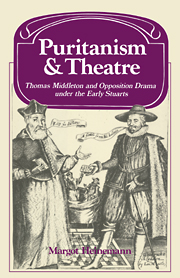Book contents
- Frontmatter
- Contents
- Introductory note
- 1 Time and Place
- 2 Puritanism, Censorship and Opposition to the Theatre
- 3 Middleton as Satirical Journalist
- 4 Early Satirical Comedies
- 5 How Anti-Puritan are Middleton's City Comedies?
- 6 Money and Morals in Middleton's City Comedies
- 7 Middle Years: Tragi-comedy and Moral Comedy
- 8 City Employments
- 9 Hard Times and Hengist, King of Kent
- 10 Political Satire: A Game at Chess
- 11 City Tragedy
- 12 Drama and Opposition, 1619–1640
- 13 From Popular Drama to Leveller Style: a Postscript
- Appendices
- Index
8 - City Employments
Published online by Cambridge University Press: 03 November 2009
- Frontmatter
- Contents
- Introductory note
- 1 Time and Place
- 2 Puritanism, Censorship and Opposition to the Theatre
- 3 Middleton as Satirical Journalist
- 4 Early Satirical Comedies
- 5 How Anti-Puritan are Middleton's City Comedies?
- 6 Money and Morals in Middleton's City Comedies
- 7 Middle Years: Tragi-comedy and Moral Comedy
- 8 City Employments
- 9 Hard Times and Hengist, King of Kent
- 10 Political Satire: A Game at Chess
- 11 City Tragedy
- 12 Drama and Opposition, 1619–1640
- 13 From Popular Drama to Leveller Style: a Postscript
- Appendices
- Index
Summary
During the last half of his career as a playwright Middleton also worked often and profitably for the Lord Mayor and the livery companies of London. Between 1613, when he was first employed to write and design a Lord Mayor's pageant, and his death in 1627, he was responsible for seven Lord Mayor's shows, as well as a number of other City entertainments, such as the shows at the opening of the New River waterworks, the Mayor's welcome to the annual shooting by the trained bands at Bunhill, and the City entertainment for the Somerset wedding celebrations. Moreover from 1620 onwards he held the post of City Chronologer, with the duty of recording important events and transactions in London – an office he seems to have discharged efficiently, though the records he wrote have been destroyed. A considerable part of his income, perhaps the greater part of it, came from these City employments.
The Lord Mayor's show, presented at the annual inauguration of the Lord Mayor of London, dated back to the mid sixteenth century, supplanting the ‘Midsummer Shows’ of the trade guilds which were a survival of medieval pageantry. Essentially it was a popular holiday, and the pageants in the streets and water-shows on the Thames were designed to impress and entertain not only the Lord Mayor and his eminent guests on their journey from the City to Whitehall and back, but also the crowds out for the day.
- Type
- Chapter
- Information
- Puritanism and Theatre , pp. 121 - 133Publisher: Cambridge University PressPrint publication year: 1980

